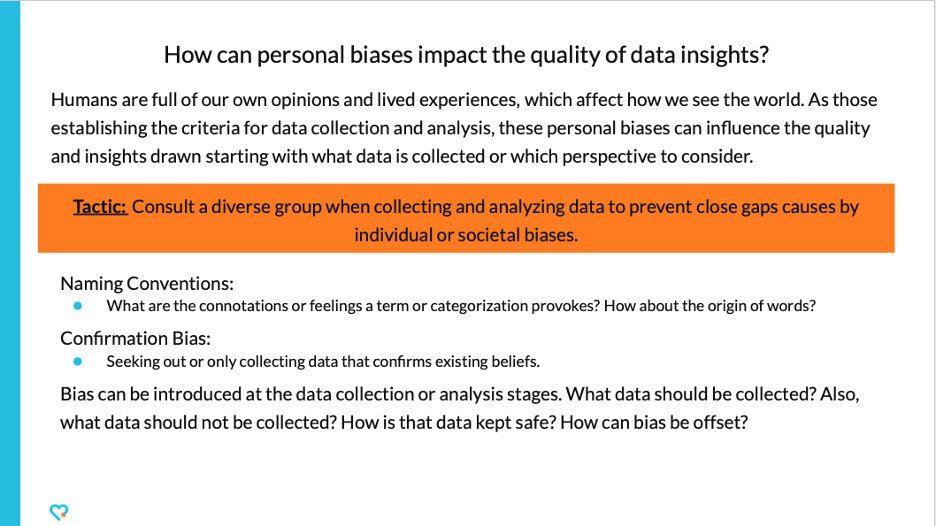Case Study: Piloting Data Equity at HopSkipDrive
Image by Wokandapix from Pixabay
– Guest article by Cindy Lin
“Data practitioners interested in the intersection of data and social issues will get a lot out of LA Tech4Good’s Equity and Ethics in Data Workshop. I had the opportunity to participate last winter and strongly believed my coworkers needed to learn what I learned: that if we are not thoughtful about how we use data, we could amplify existing issues of inequity, exclusion and discrimination.“
Fortunately, HopSkipDrive is a company that already considers equity of the utmost importance, whose mission is to create opportunity for all through mobility. My role in the organization is the Data Product Manager; I am responsible for developing and fostering the data culture within the company.
During my tenure, the company’s skills with data-driven decision making have improved. I decided to integrate important equity and ethics topics so that we make data-driven decisions that are also equitable for the communities we serve.
“The experience of introducing these topics was incredibly valuable, so I’m sharing my experience here for others thinking of or working on ensuring more equitable and ethical uses of data within their own companies.”
Preparation
The inspiration for this entire Data Equity project was the workshop with LA Tech4Good. While I was generally aware of the issues addressed, the workshop provided significant resources to thoroughly understand the long term impact of misused data, ways to identify them in practice, and concrete tactics to mitigate negative impacts.
I pitched the data equity project to my team’s executive, the SVP of Product and Operations, positioning the project and its alignment with both the purpose of the company and recent diversity, equity, and inclusion initiatives. He bought in and I officially had an executive sponsor, providing me guidance as I pushed forward on the project.
The next step was to establish the goals of this training, which I wanted to be both achievable and impactful. I did not want this project to be a one time training, but instead a part of the larger ongoing Data Culture initiative. Based on that, these are the goals I settled on:
1. Highlight how the issues of equity and ethics present themselves when using data.
2. Inspire individuals to consider these issues when working with data.
3. Provide tools to employ in order to minimize or prevent equity and ethical data issues when they are encountered.
4. Identify with team members how to continue the conversation following this initial training.
During the development of the project, I found a thought partner in the People Ops Manager. She provided tremendous help as we talked through the issues that were blocking me, including how to structure these discussions. She provided the idea to run a pilot before a full company roll out.
Pilot
I recruited seven participants, representing a mix of teams and backgrounds for the pilot. Then came the content: because the workshop content was geared more towards data professionals, I went to work summarizing the content to provide a shorter session for the average employee.
I settled on five central themes listed below and included examples of HopSkipDrive's work, discussion questions, and mitigation tactics:
• Accurate representation of the population in the datasets
• Measuring equity in datasets (this was eventually merged with the above)
• Using data to highlight inequities
• How bias can be introduced in data collection and analysis
• How data can be misused or abused to misconstrue the truth
For the participants, I provided a short list of pre-session materials to read up on the concepts ahead of time.
In the one hour pilot, the themes proved to be great discussion fodder. I was pleased participants brought up additional examples I hadn’t considered, and expressed interest in expanding the themes to their team members. I sent out a feedback survey and conducted reviews with some participants to understand what did and did not work. Here’s what I found:
Pilot Strengths
• Pre-session materials were very helpful.
• HopSkipDrive specific examples grounded the themes.
• Small group size led to open discussion amongst attendees.
• There was interest in continuing the work around Data Equity and Ethics.
• Interacting with participants from different teams helped expand individuals’ understanding of the topics and the business.
Pilot weaknesses
• It was too much to discuss all five themes in an hour
• The group being made up of members from different teams made it difficult to discuss any one example in depth and identify actions to take
• Examples too focused on one part of the company
Following the pilot and with guidance from the executive sponsor, the project plan was updated and proposed to the executive team. Full approval followed and I got to work scheduling the sessions.
Example of a topic slide used during the individual team discussions
Company Roll Out and Read Out
The structure of the discussions rollout out to each team was as follows:
• One hour discussions scheduled by team
• Two themes thoughtfully picked out for each team and examples prepared with the team’s leader ahead of the discussion
• As the moderator, I kicked off each theme but quickly opened the floor for discussion, and recorded notes and action items
• Identified how teams wanted to continue to engage with the issues
All in all, we held six team discussions. It was interesting to see some topics appear in multiple teams, and the experience different teams had with the same topic.
I was excited by the action items coming out of these discussions, some that resulted in immediate action and others not even related to data. For example, changing the term “home address” to “mailing address” for our CareDrivers, making it more inclusive for those that might be experiencing homelessness or who may not have a stable home.
Finally, it was time to share what teams had discussed with the rest of the company. Each discussion group was asked to nominate someone to review their discussion at the company town hall and were provided the following questions to help them prepare their response:
1. Talk about one or two examples of how the themes relate to the work your team does.
2. What were some concerns raised during the discussion?
3. What are the next steps your team has identified as a result of this discussion?
The resulting readout was not only a demonstration of how these issues can appear in different areas of the business, helping to solidify these concepts for everyone, but an opportunity to highlight the commitment to action in the push for equity and inclusion.
At the end of the readout, I announced the next phase of the project as a Data Equity and Ethics Working Group, a committee that meets once a month to push forward the actions identified in these discussions and a place to bring new ideas.
One of our first action items: how we bring new employees up to speed on these conversations.
Tips:
If you are considering a similar initiative within your company, here are my tips for success:
• Participate in the the LA Tech4Good Workshop.
• Find an executive sponsor that can provide guidance and advocate for the project in spaces you are not in.
• Find a separate thought partner that shares your vision and you can collaborate with to push the project forward.
• Use relevant examples to help ground the concepts in situations teams already understand.
• If there are multiple groups, share what other groups learned from the experience.
• If you work in a larger company or want to try it at a smaller scale, it’s fine to just run it once and grow the initiative from there. Don’t let perfection get in the way of progress!
Find details on our public workshops here!
About the author
Cindy Lin (she/they) is a technology professional focused on solving human problems through technology and accessible insights and data. She has worked in data and product roles across multiple industries, including in their current role as a Data Product Manager at HopSkipDrive.
HopSkipDrive offers safe and dependable transportation solutions for schools and families.



